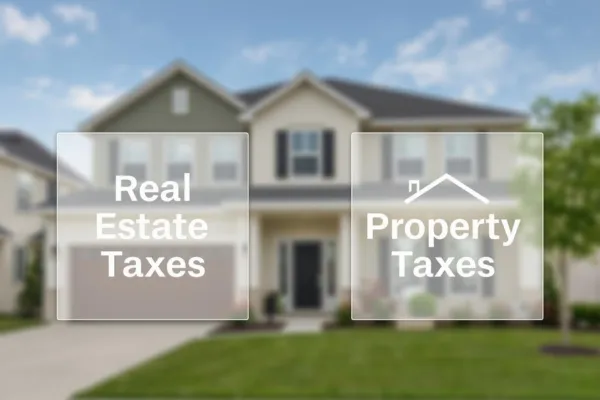
Understanding the Difference Between Real Estate Taxes and Property Taxes
When it comes to homeownership, the terms real estate taxes and property taxes are often used interchangeably. However, while closely related, they have nuanced differences that every homeowner, buyer, or investor should understand. Misunderstanding these terms can lead to confusion when budgeting for your home or reviewing your annual tax obligations.
What Are Real Estate Taxes?
Real estate taxes are taxes levied specifically on real property, which includes both the land and any structures permanently attached to it, such as a house, garage, or commercial building. These taxes are typically assessed by local governments—cities, counties, or municipalities—and are a major source of revenue for public services.
The key purposes of real estate taxes include funding:
Public schools and educational programs 📚
Local infrastructure, such as roads, bridges, and street maintenance 🛣️
Public safety services like police, fire departments, and emergency response 🚓🚒
Parks, libraries, and community services 🌳
Real estate taxes are calculated based on the assessed value of your property, which is determined periodically by a local tax assessor. The rate applied to this value, often expressed as a millage rate or percentage, determines how much tax a property owner must pay annually.
What Are Property Taxes?
Property taxes is a broader term that can encompass taxes on all types of property, not just real estate. This includes personal property—like vehicles, boats, and business equipment—depending on your state or county regulations. In everyday conversation, however, “property taxes” is commonly used to refer to taxes on real estate, which is why the terms are often confused.
Some key points about property taxes:
They may include additional levies, such as special assessments for local projects or bonds 🏗️
Rates and exemptions can vary significantly based on location, property type, and owner status (e.g., senior or veteran exemptions) 💰
Nonpayment of property taxes can lead to serious consequences, including penalties, interest, or even property liens and foreclosure ⚠️
Essentially, all real estate taxes are property taxes, but not all property taxes are real estate taxes. Property taxes are an umbrella term, while real estate taxes are a specific subset focused on land and structures.
Why Understanding the Difference Matters
Knowing the distinction between these two types of taxes is crucial for several reasons:
Financial Planning: Budgeting for homeownership involves more than just the mortgage. Understanding exactly what your local real estate tax obligations are helps you plan accurately for monthly or annual costs. 💵
Buying or Selling Property: When purchasing a home, real estate taxes may influence the overall cost of ownership and your monthly escrow payments. Sellers may also need to prorate taxes during closing. 🏡
Investment Considerations: For investors, distinguishing between real estate taxes and other property taxes (like personal property taxes on rental equipment) can impact cash flow projections and profitability analyses. 📊
Exemptions and Relief Programs: Different programs may apply specifically to real estate taxes. For example, some jurisdictions offer homestead exemptions, senior exemptions, or veteran tax relief that can reduce your real estate tax burden. Knowing the exact term ensures you access the right benefits. ✅
Key Takeaways
Real estate taxes are a type of property tax levied specifically on land and structures.
Property taxes are a broader category that includes real estate and, in some cases, personal property.
Understanding the distinction helps with budgeting, tax planning, and maximizing eligible exemptions.
Local government websites or tax assessor offices are the best resources for up-to-date rates, exemptions, and payment guidelines. 🌐
By knowing the difference between real estate taxes and property taxes, homeowners and investors can make informed decisions, avoid surprises at tax time, and take full advantage of any exemptions or relief programs available. Proper planning ensures that property ownership remains both rewarding and financially manageable.
